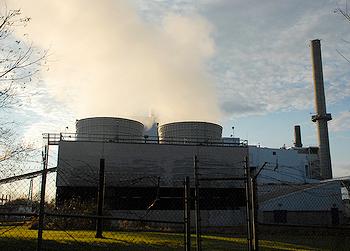US biomass energy facilities escape greenhouse gas rule
The U.S. Environmental Protection Agency said Wednesday it will defer greenhouse gas permit requirements for biomass energy production for at least three years for reconsideration of the science and rulemaking.
 |
|
The Joseph C. McNeil Generating Station, a biomass incinerator, has been the municipal power plant for Burlington, Vermont since 1981. |
Sources covered by this decision include facilities that emit the greenhouse gas carbon dioxide, CO2, as a result of burning forest or agricultural products for energy, wastewater treatment and livestock management facilities, landfills and fermentation processes for ethanol production.
On May 13, 2010, EPA announced the Greenhouse Gas Tailoring Rule and included greenhouse gas emissions from biomass energy in the permit program.
The deferral is in response to a petition by the National Alliance of Forest Owners' to reconsider the treatment of biomass carbon emissions under the Tailoring Rule. NAFO members own more than 79 million acres of forestlands in 47 states.
EPA Administrator Lisa Jackson said, "We are working to find a way forward that is scientifically sound and manageable for both producers and consumers of biomass energy. In the coming years we will develop a commonsense approach that protects our environment and encourages the use of clean energy."
"Renewable, homegrown power sources are essential to our energy future, and an important step to cutting the pollution responsible for climate change," she said.
In letters dated January 12 to Congresswoman Debbie Stabenow, Senator Max Baucus and other biomass supportive lawmakers explaining the deferral, Jackson emphasized her confidence in biomass as an environmentally sound fuel choice.
"As you know," she wrote, "biomass can be part of a national strategy to reduce dependence on fossil fuels, and efforts are underway to foster the expansion of renewable resources and promote biomass as ways of addressing climate change and enhancing forest management."
By July 2011, Jackson said EPA plans to complete a rulemaking that will defer permitting requirements for carbon dioxide emissions from biomass-fired and other biogenic sources for three years. Biogenic sources include ethanol producers.
NAFO president and chief executive Dave Tenny applauded the EPA's action as "a critical step toward recognizing the full carbon benefits of biomass as a leading source of renewable energy."
"The three-year moratorium is an appropriate response to NAFO's request," said Tenny. "It will allow the EPA and the U.S. Department of Agriculture to work with Congress, biomass producers and users, scientists and other interested parties to develop a science-based policy supporting a vibrant biomass energy sector for the long term without penalizing biomass energy production in the interim."
 0
0 






